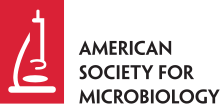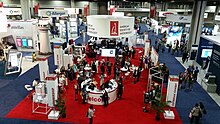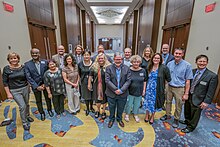American Society for Microbiology
 | |
| Abbreviation | ASM |
|---|---|
| Formation | 1899 |
| Type | Learned society, Nonprofit |
| Purpose | to promote and advance the microbial sciences |
| Location |
|
| Field | Microbiology |
| Membership | 30,000 |
| Website | asm |
Formerly called | Society of American Bacteriologists |
The American Society for Microbiology (ASM), originally the Society of American Bacteriologists, is a professional organization for scientists who study viruses, bacteria, fungi, algae, and protozoa as well as other aspects of microbiology. It was founded in 1899. The Society publishes a variety of scientific journals, textbooks, and other educational materials related to microbiology and infectious diseases. ASM organizes annual meetings, as well as workshops and professional development opportunities for its members.
History
ASM was founded in 1899 under the name the "Society of American Bacteriologists." In December 1960, it was renamed the "American Society for Microbiology."[1]
Mission
ASM's mission is "to promote and advance the microbial sciences."[2] The society seeks to accomplish this mission through:
- Publishing highly cited publications
- Running multi-disciplinary meetings
- Deploying resources and expertise around the world
- Advocating for scientific research
- Fostering a deeper public understanding of microbiology
Membership
ASM has more than 36,000 members, including researchers, educators and health professionals. Membership is open to all and is offered at a discounted rate to students, postdoctoral fellows and emeritus faculty. Members pay annual dues to support the activities of ASM.[3] ASM's newest Clinical Lab Scientist membership category was established in 2019.
ASM provides professional development opportunities and supports microbiology professionals through 60 fellowships and 300 travel awards, webinars, conferences, workshops, networking opportunities, continuing education and honorific awards.
Meetings

ASM hosts meetings and conferences, including the annual meeting ASM Microbe, that provide forums to explore microbiology topics.
ASM Microbe, a combination of what was formerly the ASM General Meeting and the Interscience Conference on Antimicrobial Agents and Chemotherapy, includes sessions in eight specialty tracks:
- Antimicrobial Agents and Resistance
- Applied and Environmental Science
- Clinical Infections and Vaccines
- Clinical and Public Health Microbiology
- Ecology, Evolution and Biodiversity
- Host-Microbe Biology
- Molecular Biology and Physiology
- Profession of Microbiology
Other ASM meetings and conferences cater to narrower audiences, including: ASM Biothreats (formerly ASM Biodefense and Emerging Diseases Research) which focuses on biodefense and emerging diseases, the Clinical Virology Symposium which focuses on viral infections, the Conference for Undergraduate Educators which focuses on biology education at the undergraduate level and the Annual Biomedical Research Conference for Minority Students which highlights microbiology research from underrepresented populations.
Publications
ASM publishes 18 journals. ASM accepts format-neutral submissions for all primary research journals since 2018. ASM's open-access journals are:
Other ASM journals include:
- Antimicrobial Agents and Chemotherapy
- Applied and Environmental Microbiology
- Clinical and Vaccine Immunology
- Clinical Microbiology Reviews
- EcoSal Plus
- Eukaryotic Cell
- Microbiology Resource Announcements
- Infection and Immunity
- Journal of Bacteriology
- Journal of Clinical Microbiology
- Journal of Virology
- Microbiology and Molecular Biology Reviews
- Microbiology Spectrum
- Molecular and Cellular Biology
The society also publishes Microcosm, a quarterly news magazine for members. Through its publishing arm ASM Press, the society publishes books covering diverse topics. Wiley is co-publisher and distributor of the ASM Press books and ebooks.
American Academy of Microbiology
The American Academy of Microbiology (AAM) is the honorific leadership group within the American Society of Microbiology, a professional organization for microbiologists. The academy is currently composed of over 2,600 Fellows.[5]
The mission of the academy is to "recognize outstanding contributions provided by microbiologists and to provide microbiological expertise to both the wider scientific community and the public."[6] Activities of the academy include electing new members, convening colloquia, and managing the ASM Awards and Prize program. Academy leadership is divided into four groups: the Academy Governors, the Academy Leadership Nominating Subcommittee, the Subcommittee on Awards, and the Subcommittee on Elections.
Origins
The AAM was first proposed in 1956. The original organization was dissolved in 1970, when new bylaws were accepted.[7]
Members
The AAM elects a new class each year. As of 2020, each year 65 new members are elected.[8][9] That number has fluctuated historically to as many as 110.[9] Membership is not exclusive to American residents, and indeed 19% of members currently live outside the U.S.[9] The 2021 class of Fellows included representatives of 11 countries, including France.[10]
In 2021, there were 150 nominations,[11] and 130 nominations the following year.[9][12] The call for nominations begins in August. Only current AAM fellows can nominate a new fellow, and that nomination must be supported by at least two other AAM fellows. Candidates cannot apply for fellowship directly, but can reach out to current fellows to seek nomination. The nomination deadline is in October. The Sub-committee of Elections and the Academy Governors, which are composed of AAM members elected by the entire AAM membership, then vote to approve of the nominations.

Members of the AAM are elected through an annual peer-reviewed process based on their records of scientific achievements that have advanced microbiology. The academy administers ASM scientific achievement awards that honor important contributions to basic and applied research, microbiology education, and scientific and professional leadership.[9] There is no limit to the number of times a person can be nominated, nor an age limit for nomination.[9] Notable academy members include Anthony Fauci (former director of the National Institute for Allergies and Infectious Disease) and Rita Colwell (former director of the National Science Foundation).
Activities
The AAM holds colloquia, sometimes in conjunction with other scientific societies, on topics pertinent to public interests and the expertises of its members. Topics include climate change,[13][14][15] One Health, and clinical diagnostics. Reports from the colloquia are made publicly available.
In addition to communicating via colloquium reports, mBio, a journal launched by ASM in 2009, offers an ‘AAM track’ where AAM members are allowed to submit one manuscript per year.[16] Fellows are required to submit two reviews per submission, make modifications that address the reviewers’ comments, then submit the revised version to the mBio editors.[16] However, submission does not guarantee acceptance.
The AAM also selects an Honorary Diversity Lecturer. This award, aimed to attract more under-represented minorities to the field, is given to a mid-to-senior level scientist who is both highly accomplished and an "outstanding" speaker.[17]
American College of Microbiology
The American College of Microbiology (ACM) certified microbiologists and immunologists and provided accreditation of postdoctoral training programs.[18]
- The American Board of Medical Microbiology (ABMM) certified doctoral-level microbiologists.[18]
- The American Board of Medical Laboratory Immunology (ABMLI) certified doctoral-level immunologists.[18]
- The National Registry of Certified Microbiologists (NRCM) certified microbiologists at the prebaccalaureate/baccalaureate, master's, and doctoral levels in biological safety; food; and pharmaceutical and medical device.[18] Four certifications were offered with a Registered Microbiologist (RM) and Specialist Microbiologist(SM).[19][20] The exams were last offered in April 2018 with applicants being directed to ASCP (M) an SM for the medical microbiology certification ABSA International RBP and CBSP for biosafety .[21]
- SM: Biological Safety
- SM: Pharmaceutical and Medical Device
- RM: Pharmaceutical and Medical Device
- RM: Food Safety and Quality
Public outreach
ASM promotes a public understanding of microbiology through science festivals, public outreach campaigns and museum exhibits.[22][23] ASM engages the science-interested public and microbiologists through articles reaching nearly 25,000 readers per month, 9 podcasts[24] with 1.5 million downloads and close to half a million social media followers. ASM also runs an annual agar art contest.[25][26][27]
ASM produces eight podcasts, including This Week in Microbiology,[28] This Week in Virology, and This Week in Parasitism, hosted by Vincent Racaniello. Mundo de los Microbios hosted by Gary Toranzos, is ASM's weekly Spanish-language podcast. Meet the Microbiologist is a podcast hosted by Julie Wolf, Ph.D., that showcases the people behind the scientific discoveries in various cutting-edge areas of the microbial sciences.[29]
Advocacy
ASM empowers members to advocate for the highest standards in scientific practice and provides members opportunities to advocate for evidence-based scientific policy.
In 2011, ASM made a concerted effort to address the lack of visibility of its policy arm, specifically in promoting the interests of clinical microbiologists. The Public and Scientific Affairs Board Professional Affairs Committee and Committee on Laboratory Practices was active in influencing policy decisions through Congress, the Clinical Laboratory Coalition, the FDA, and the CDC.[30]
ASM restructured its advocacy program to enhance its effectiveness in Washington, D.C., and its expansion to the Branches and various local communities. In 2018, ASM engaged members of Congress and issued statements in conjunction with Congressional hearings focusing on recent outbreaks of vaccine-preventable diseases like the measles. In 2017 and 2018, ASM played a leading role, working with coalition partners, to raise the federal budget caps and advance funding for science and public health agencies like the National Institutes of Health, National Science Foundation, National Institute for Food and Agriculture at the USDA and the Centers for Disease Control and Prevention. ASM members sent nearly 2,000 messages to Members of Congress in support of increased science funding. Noteworthy is the appreciation of ASM by CDC, since raising the caps made specifically possible the construction of the new biocontainment lab.
In 2018, ASM advocated successfully for establishing PACCARB (President's Advisory Council for Combatting Antibiotic Resistance Bacteria) into the law (from an Obama administration Executive Order), by including language in the Pandemic and All-Hazards Preparedness and Advancing Innovation Act. ASM convened a meeting with more than 20 stakeholder groups to discuss a collective path forward for federally-focused advocacy in support of microbiome research.
See also
References
- ^ "Timeline of the Society. Reference Documents". Center for the History of Microbiology/ASM Archives. Retrieved 2019-05-17.
- ^ "Who We Are". American Society for Microbiology. Retrieved 2 October 2016.
- ^ "Membership". American Society for Microbiology.
- ^ "mBio". mbio.asm.org.
- ^ "CETI Researcher Elected as a Fellow into the American Academy of Microbiology :: Center for Evolutionary & Theoretical Immunology | The University of New Mexico". ceti.unm.edu. Retrieved 2023-08-04.
- ^ "American Academy of Microbiology". ASM.org. Retrieved 2022-09-06.
- ^ Yee, Karen. "LibGuides: Center for the History of Microbiology/ASM Archives (CHOMA): American Academy of Microbiology". lib.guides.umbc.edu. Retrieved 2022-09-06.
- ^ Greta (2021-02-20). "Two from Biosciences Elected American Academy of Microbiology Fellows". Biosciences Area. Retrieved 2023-08-04.
- ^ a b c d e f Casadevall, Arturo; Lodge, Jennifer K.; Nguyen, Nguyen K. (2022-06-28). "On Election to the Fellowship of the American Academy of Microbiology". mBio. 13 (3): e0088922. doi:10.1128/mbio.00889-22. ISSN 2150-7511. PMC 9239118. PMID 35543512.
- ^ "Rob Arkowitz elected fellow of the American Academy of Microbiology (AAM) – iBV". 2021-03-01. Retrieved 2023-08-04.
- ^ "USGS Scientist elected as Fellow to American Academy of Microbiology | U.S. Geological Survey". www.usgs.gov. Retrieved 2023-08-04.
- ^ "Mansfield Elected to Fellowship in American Academy of Microbiology | Institute for Integrative Toxicology | Michigan State University". iit.msu.edu. Retrieved 2023-08-04.
- ^ Microbiology, American Society for. "New ASM Academy report shows critical role microbes play in climate change". phys.org. Retrieved 2023-08-04.
- ^ "New Report: Microbes Play Critical Role in Climate Change | Kauai Now". | New Report: Microbes Play Critical Role in Climate Change. Retrieved 2023-08-04.
- ^ "Microbes play critical role in climate change in new report". Mirage News. Retrieved 2023-08-04.
- ^ a b Casadevall, Arturo; Shenk, Thomas (2017-03-08). "The mBio American Academy of Microbiology Submission Track in 2017". mBio. 8 (1): e00050–17. doi:10.1128/mBio.00050-17. ISSN 2161-2129. PMC 5296597. PMID 28174305.
- ^ "UK's Goodin is Honored by American Academy of Microbiology". UKNow. 2018-06-04. Retrieved 2023-08-04.
- ^ a b c d "American College of Microbiology". ASM. 7 July 2009. Retrieved 11 April 2024.
- ^ "Certification by the National Registry of Certified Microbiologists Is an Asset to Your Career". www.food-safety.com. September 24, 2013.
- ^ "American College of Microbiology - Exam Information". ASM. 27 July 2010.
- ^ "NRCM Q & A Why are the NRCM exams being phased out?" (PDF). ASM. Retrieved 11 April 2024.
- ^ Chimileski, Scott (September 28, 2015). "Bringing the Microbial World into our Natural History Museums".
- ^ "American Society for Microbiology presents Day of Science - CultureMap Houston". houston.culturemap.com. Retrieved 2024-01-12.
- ^ "American Society for Microbiology - All Podcasts". chartable.com. Retrieved 2024-01-12.
- ^ "ASM Agar Art Contest | Overview". ASM.org. Retrieved 2024-01-12.
- ^ "This gorgeous art was made with a surprising substance: live bacteria". Science. 2019-11-20. Retrieved 2024-01-12.
- ^ Amsen, Eva. "Bacteria Become Art Tools In Annual Agar Art Competition". Forbes. Retrieved 2024-01-12.
- ^ "Microbiology Talk: Four Microbiology Podcasts to Check Out". The Microbial Menagerie. 2020-09-16. Retrieved 2024-01-12.
- ^ Skye, Amber (2022-06-16). "Meet the Microbiologist podcast". Flinders Accelerator for Microbiome Exploration. Retrieved 2024-01-12.
- ^ Baselski, Vickie; Sharp, Susan E. (December 2011). "What Has the American Society for Microbiology Done Lately for Clinical Microbiologists?". Journal of Clinical Microbiology. 49 (12): 4417. doi:10.1128/JCM.05824-11. ISSN 0095-1137. PMC 3232952. PMID 22124019.
External links
 Media related to American Society for Microbiology at Wikimedia Commons
Media related to American Society for Microbiology at Wikimedia Commons- Official website
- Clinical Microbiology Portal
- MicrobeWorld
